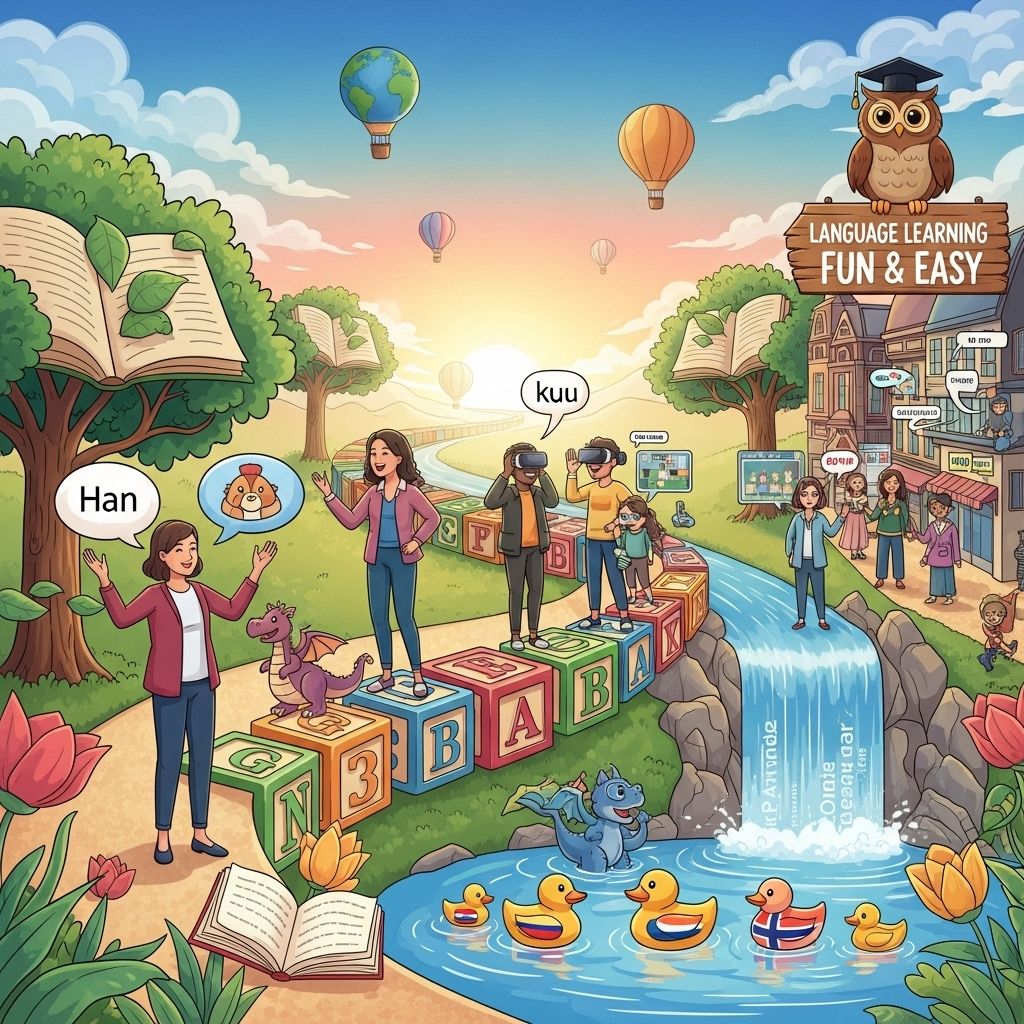Learning a new language can often feel like a daunting task, filled with complex grammar rules, vocabulary lists, and pronunciation challenges. However, integrating fun and engaging methods into your language learning journey can dramatically enhance your experience and retention. In this article, we will explore various strategies, tools, and resources that can make language learning enjoyable and effective.
Table of Contents
Gamification in Language Learning
One of the most effective ways to make language learning fun is through gamification. By incorporating game-like elements into the learning process, you can boost motivation and engagement. Here are some popular platforms that provide gamified language learning experiences:
- Duolingo: A widely-used app that transforms language lessons into interactive games.
- Memrise: Combines spaced repetition with fun challenges, including community-created games.
- Busuu: Provides interactive language exercises along with feedback from native speakers.
The Benefits of Gamification
Gamification offers several advantages, including:
- Increased motivation through rewards and achievements.
- Immediate feedback on language skills, helping learners recognize their progress.
- A supportive community engagement that encourages regular practice.
Utilizing Media for Language Exposure
Incorporating various media types into your language learning can be incredibly beneficial. Engaging with films, music, podcasts, and books can enhance comprehension and pronunciation. Here’s how:
1. Movies and TV Shows
Watching films and series in your target language can vastly improve your listening skills and cultural understanding. Here are some tips:
- Start with subtitles in your native language, then switch to subtitles in the target language.
- Re-watch scenes to catch new vocabulary and phrases.
- Try to mimic the pronunciation and intonation of the characters.
2. Music
Listening to music can be a fun way to learn new words and phrases. Consider the following:
- Find artists who sing in your target language and explore their lyrics.
- Use apps like Genius that provide lyrics and translations.
- Create playlists of your favorite songs to immerse yourself in the language.
3. Podcasts and Audiobooks
Podcasts and audiobooks are excellent for developing listening skills while multitasking. Look for:
- Language-specific podcasts suitable for your level.
- Engaging stories or educational content in your target language.
- Transcripts to follow along and enhance understanding.
Interactive Learning through Social Media
Social media platforms are a treasure trove for language learners. They offer opportunities to practice and engage with others in a fun way:
1. Language Exchange Platforms
Connect with native speakers who want to learn your language through apps like:
- Tandem: Match with language partners for text, audio, and video chats.
- HelloTalk: Focus on learning through social interactions with native speakers.
2. Utilizing Instagram and TikTok
Follow accounts that share language tips, challenges, and cultural insights. For example:
- Hashtags: Search for hashtags like #languagelearning or #polyglot to discover content.
- Challenges: Participate in language challenges that encourage daily practice.
Creating a Structured Learning Plan
While fun activities are essential, having a structured plan can help keep you on track. Consider the following elements:
1. Setting Clear Goals
Define what you want to achieve and by when. Ensure your goals are:
- Specific: Learn 100 new vocabulary words in a month.
- Measurable: Track progress through quizzes or conversations.
- Achievable: Set realistic timelines based on your schedule.
2. Daily Practice
Consistency is key in language learning. You can:
- Dedicate 15-30 minutes a day to practice.
- Use language learning apps during your commute.
- Keep a journal in your target language.
Joining Language Communities
Becoming part of a learning community can enhance motivation and provide support. Consider these options:
1. Online Forums
Join forums like Reddit’s language learning communities to share experiences, resources, and encouragement.
2. Local Meetups
Look for local clubs or meetups where you can practice speaking with others. Websites like Meetup.com can help you find nearby groups.
Maintaining Motivation and Addressing Challenges
Language learning can come with ups and downs. Here’s how to maintain motivation and overcome obstacles:
1. Celebrate Small Victories
Recognize and celebrate even minor achievements. This can be:
- Completing a chapter in your language book.
- Successfully having a conversation with a native speaker.
- Learning a new grammar rule.
2. Dealing with Plateaus
It’s normal to hit plateaus in your learning journey. When this happens:
- Change up your learning methods to reignite interest.
- Break your routine by joining a language class or workshop.
- Take a short break and return with fresh motivation.
Conclusion
Language learning is not just about studying hard; it’s about having fun and immersing yourself in the culture and community that come with it. By incorporating gamification, media, social interactions, and maintaining a structured approach, you can transform your language learning experience into an enjoyable journey. Remember: the goal is to communicate, connect, and enjoy the process!
FAQ
How can I make language learning enjoyable?
Incorporate games, interactive apps, and cultural activities like cooking or music to keep the learning process fun.
What are some effective resources for language learning?
Utilize language learning apps, podcasts, YouTube channels, and online courses to enhance your skills.
Can I learn a new language on my own?
Yes, self-study is possible with the right materials and dedication, but consider joining language exchange programs for practice.
How long does it take to learn a new language?
The time varies by individual and language complexity, but consistent practice can lead to noticeable progress in a few months.
What techniques help retain new vocabulary?
Use flashcards, spaced repetition, and context-based learning to effectively memorize and retain new words.
How can I practice speaking a new language?
Engage in conversation with native speakers, join language meetups, or practice speaking aloud with language learning apps.




